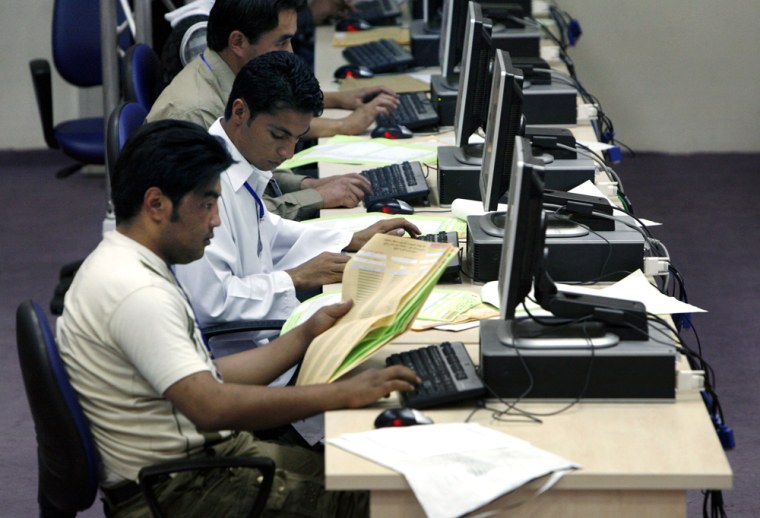In a largely illiterate country where donkeys delivered ballots to remote areas, Afghan officials say they are confident that algorithms, double-blind computer entries and other modern methods will catch 90 percent of the fraud from last week's presidential election.
Accusations of ballot box stuffing and voter intimidation have streamed in to the independent Electoral Complaints Commission since Thursday's vote — most of them filed by President Hamid Karzai's main rival, ex-Foreign Minister Abdullah Abdullah.
Forty-five of the complaints are serious enough that they could affect the election outcome, said Grant Kippen, the head of the U.N.-backed body.
Nevertheless, Ajmal Amin Rabmal, one of three experts overseeing the commission's computer monitoring, said he's confident his team can spot fraud cases, using techniques that hardly fit the image of a country where ballots were marked with the candidates' faces and symbols to help the 75 percent of Afghans who can't read and write.
"Ninety percent (of fraud) we are going to catch," Rabmal said Monday.
Finance minister claims Karzai win
International officials have cautioned candidates and their supporters to hold off on victory claims until the votes are in and the fraud claims resolved. But the advice has not always been heeded.
On Monday, Finance Minister Hazrat Omar Zakhilwal said Karzai handily won with close to 70 percent of the vote, according to Zakhilwal's top adviser, Najibullah Manalay. The claim, which relied on information from Karzai's campaign team, was made at a private dinner one day before the first preliminary election results are due to be released and weeks before a winner is officially declared.
"According to this information President Karzai has won, but nobody in Afghanistan can officially announce any figures except for the election commission, so as I told you the figures presented in this meeting had no official value," Manalay said.
A spokesman for Abdullah dismissed the claim and said it was aimed at swaying Afghan opinion.
Claims and counterclaims have added to the mounting questions about the election's credibility, which are threatening to undermine President Barack Obama's Afghan strategy. The Obama administration hopes the election will produce a leader with a strong mandate to confront the Taliban insurgency.
U.S., U.N. and European Union officials have urged candidates to show patience as the commission investigates fraud claims, fearing that the increasingly strident rhetoric could trigger street protests and poison the political atmosphere at a time when the country needs unity.
"There's a process to deal with these fraud allegations and we need to wait patiently while that process moves forward," said Timothy Michael Carney, a retired U.S. ambassador in charge of the U.S. election team.
Computer programs spot questionable figures
The commission uses computer programs that spot questionable figures.
For example, if Karzai were to receive 10 percent of the vote in three of four polling stations in the same area but 95 percent in a fourth station, the computers will flag the return as suspicious, Rabmal said.
Tamperproof bags that carry ballots back to Kabul are coded with serial numbers and will prevent people without proper training from slipping fake ballots into the system, Rabmal said. Ballot boxes with too many votes will also be thrown out, he said.
Ballot tabulation will be done using a double blind entry system. If one computer programmer tries to pad a candidate's return, a second programmer would have to enter the same number — or an alarm is triggered. Because the process is blind, programmers cannot collaborate, Rabmal said.
Of the first 29 boxes of ballots to be processed, two were flagged for potential violations, Rabmal said.
Zekria Barakzai, the deputy chief electoral officer, said the counting for this year's vote is far more advanced than in 2004 — the last presidential election.
The Electoral Complaints Commission — a separate body from the Independent Election Commission — has opened an investigation into allegations of ballot box stuffing in the Spin Boldak region of Kandahar, potential fraud cited by Abdullah at a news conference Sunday.
Threats dampened turnout in the south
Though millions of Afghans went to the polls, Taliban threats dampened turnout in the south. Those who voted did so amid rocket attacks in the south, a gunbattle in the capital, and fighting that trapped people inside stations in the east.
Election officials said they will release preliminary returns from the vote on Tuesday, although the final result will not be known for weeks.
Both the Karzai and Abdullah campaigns have said preliminary reports suggest their candidate is ahead, raising concern that the release of partial figures could stoke tension and generate even more accusations of manipulation from the disappointed camp.
All that could lead to a protracted period of claims and counterclaims that could delay formation of a new administration and poison the political atmosphere at a time when the United States and its NATO partners are trying to bring together ethnic, political and social groups opposed to the Taliban in order to roll back the insurgency.
